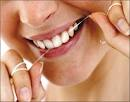TAKE CARE OF YOUR BRUSH
Your toothbrush goes to work for you every day, so make sure you take good care of it and replace it every three to four months, or sooner if the bristles appear worn, to make sure it is cleaning effectively.
It’s a good idea to thoroughly rinse your brush each time and store it in an upright position where it can air dry between uses. Avoid storing your toothbrush in a closed container or covering it, as the moist conditions can encourage the growth of bacteria.
AVOID SPREADING GERMS
With the many winter colds and flu bugs, it’s important to replace your toothbrush after you've been sick. Never share your toothbrush, as it can result in exchange of germs between users.
If toothbrushes are stored in the same holder, make sure they are separated to prevent cross-contamination. People with compromised immune systems might consider replacing toothbrushes more frequently to decrease exposure to bacteria.
WEAR A MOUTH GUARD
If you like to venture out on the ice for a bit of hockey or hit the court for a basketball game, be sure to wear a mouth guard to protect your teeth. Oral health injuries among athletes account for more than 600,000 emergency room visits per year, and sports-related injuries account for three times more facial/dental injuries than violence or traffic accidents. Mouth guards not only protect the teeth and gums but cut the risk of concussion by 50 percent.
DRINK LOTS OF WATER
Make sure to keep drinking plenty of water — fluoridated is best — throughout the winter months. The water will help wash away food particles and reduce the presence of bacteria in your mouth. Staying hydrated also will keep your body producing a healthy amount of saliva, which works to help build and maintain the health of soft and hard tissues in your mouth.
DON’T IGNORE SENSITIVITY
If the cold air is bothering your teeth, be sure to get it checked out. Your dentist can help determine if there is a problem or if it is general sensitivity that can be taken care of with special toothpaste.
SEE YOUR DENTIST REGULARLY
Regular exams and cleanings will help you prevent problems and identify them early so they can be addressed in the most effective way possible. Don’t put off scheduling your dentist appointment.
Reference:
Brought to you by the 600 members of the West Michigan District Dental Society in Kent , Ottawa , Ionia , Montcalm and Mecosta counties. West Michigan District Dental Society dentists also are members of the Michigan


















